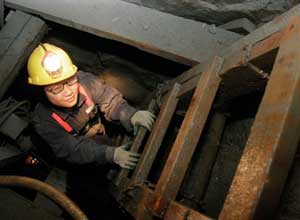Mining Engineer
Tasks & duties

Mining engineers may do some or all of the following:
-
prepare designs, plans and schedules for mining operations
-
research and develop new mining methods and technology
-
determine the equipment to be used to create/develop the mine
-
prepare reports on proposed mines
-
consult with clients, professionals, and government officials
-
carry out pre-feasibility and feasibility studies, and control the cost of the operation
-
co-ordinate work in progress on the mine site
-
discuss work in progress and consult with contractors, engineers, geologists, and surveyors
-
prepare reports on work in progress
-
design and supervise work involving explosives
-
ensure safety and environmental standards are met and maintained
-
attend meetings with other mine staff to discuss issues related to the mine
-
study ways to improve mining
-
carry out economic analysis on mineral deposits
-
examine and work towards minimising the impact of mining on the environment
Specialisations
Mining engineers may specialise in the following areas:
Academic and Research Mining Engineer
Academic and research mining engineers often work in universities or research centres. They may specialise in fields such as rock engineering, mining economics, or geology project design.
Coal Mining Engineer
Coal mining engineers work in open pit or underground mines and tend to use a variety of mining methods.
Consultant Mining Engineer
Mining engineers who work as consultants are involved in a wide variety of projects, mining methods and different technical areas. They use computer programs to model the mining process and design, and can work on open pit and underground mines.
Open Pit Mining Engineer
Open pit mining engineers work in surface mines that are open to the daylight, such as quarries. These mines may also be referred to as open-cut or opencast mines.
Underground Mining Engineer
Underground mining engineers work in deep mines that are usually located several hundred feet underground. The minerals in these mines are removed mechanically and transferred by shuttle car or conveyor to the surface.
Skills & knowledge

Mining engineers need to have:
-
project management, people management and leadership skills
-
proposal writing and presentation skills
-
knowledge of mining methods and different mining processes
-
knowledge of the practical aspects of operating a mine
-
knowledge of geology, maths, physics, and chemistry
-
excellent communication skills
-
analytical, research and computer skills
-
problem-solving skills
-
decision-making abilities
-
finance and budgeting skills
Entry requirements
To become a mining engineer you need a Bachelor of Engineering (majoring in resource or mechanical engineering). Undergraduates must gain some practical experience while studying and this is usually organised as part of the course.
Mining engineers usually spend three years on a graduate mining engineer programme before they become fully qualified. To take charge of a mining site as a mining engineer you must hold a Certificate of Competence issued by the Extractive Industries ITO (EXITO).
Mining engineering graduates usually begin on-site in a junior mining engineer capacity, and gain training and experience working alongside miners, surveyors and geologists.
Secondary education
Bursary or NCEA equivalent maths with calculus and physics is usually required to enter tertiary training.
Tertiary education
State-owned Solid Energy offers nine annual general tertiary scholarships for secondary students attending schools in their local mining communities.
Training on the job
Mining engineers must keep up to date with developments in the field through attending seminars, courses, and conferences. Other important sources of information are the Internet and sharing information with colleagues.
Useful experience
Experience in mining, quarrying or construction is useful, as is a strong interest in geology and civil engineering.
Related courses
Chemical Engineering
Construction Engineering
Environmental Engineering
For more information, please refer to Career Services.
Document Actions
